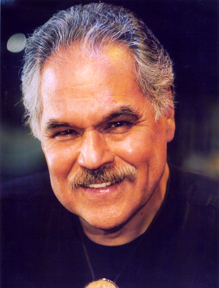Luis Valdez, playwright and human rights activist, will present “Run for the Border: The Transmutation of a Hollywood Myth,” at 7 p.m. Oct. 19, at the Clifford E. White Theatre as part of the Cline Lecture Series. The talk will be preceded by performances of some of Valdez‘s “Actos” by NAU Theater students.
In the 1970s, Valdez became the first Chicano to have a play produced on Broadway—Zoot Suit—which still tours internationally and was made into a film in 1982. A free screening of Zoot Suit will be at 7 p.m. Monday, Oct. 18, in the Cline Library Assembly Hall. The film originally was an award-winning play, which shone the national spotlight on Valdez and his theater company. The screening will be hosted by Kate Ellis, associate professor in the Theater Department.
“Valdez is a human rights pioneer who believes the arts matter when it comes to politics and activism,” said Gioia Woods, associate professor of Comparative Cultural Studies. “His presence on campus will powerfully inform our discussions over SB1070 and immigration issues.”
The son of migrant farmworkers, Valdez helped César Chávez organize workers for the Great Delano Grape Strike of 1965. He is considered the father of Chicano theater and is the founder of El Teatro Campesino, the farm workers theater movement that famously raised issues facing Mexican Americans—the struggle for unionization, the Vietnam War, the drive for bilingual education, the war against drug addiction and crime and community control of parks and schools.
Valdez also wrote and directed television productions and the hit film La Bamba in the 1980s.
The Cline Lecture Series is managed by the Humanities Program and the Department of Comparative Cultural Studies. It is made possible through an endowment left by the late historian Platt Cline, who wished to annually “demonstrate the social usefulness of the humanities.”
Sponsors include the College of Arts and Letters, College of Social and Behavioral Sciences, department of Comparative Cultural Studies, the Multicultural Student Center, the Martin-Springer Institute, the Ethnic Studies Program, the Latin American Studies Program, the department of Theater and the department of Politics and International Affairs.



